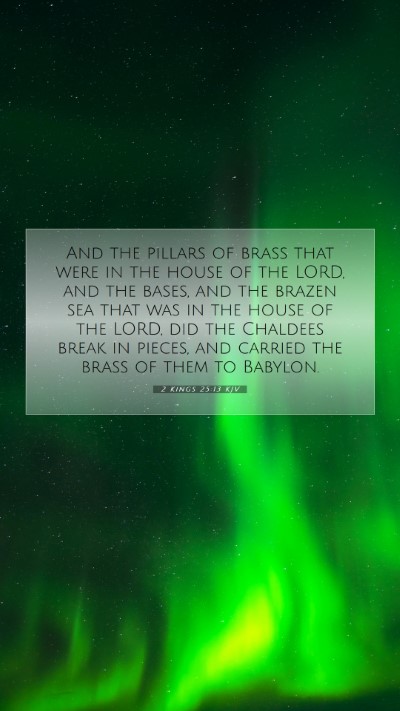Understanding 2 Kings 25:13
Bible Verse: 2 Kings 25:13 - "And the pillars of brass that were in the house of the Lord, and the bases, and the brasen sea that was in the house of the Lord, did the Chaldeans break in pieces, and carried the brass of them to Babylon."
Bible Verse Meaning and Interpretation
This verse describes a critical moment in the history of Jerusalem, specifically during the Babylonian siege. The verse emphasizes the destruction wrought by the Chaldeans (Babylonians) as they destroyed sacred objects in the temple, which were of great significance to the Israelite people. By combining insights from renowned public domain commentaries, we can gain a deeper understanding of this passage.
Insights from Commentaries
Matthew Henry's Commentary
Matthew Henry elucidates that the devastating act of tearing down the brass pillars and other sacred items is a representation of the complete desolation of the temple. These actions symbolized the final blow to the identity and worship of the Israelites, signifying not just a physical destruction but also a spiritual one. The temple was where God’s presence dwelled among His people, and its destruction indicated the departure of God’s favor and protection.
Albert Barnes' Notes
Albert Barnes provides a historical perspective, noting that the brass pillars and the brazen sea were magnificent works of artistry and craftsmanship that reflected the glory of God. Their destruction marks the end of an era for the Israelites. He points out that the brass sea, used for ceremonial cleansing, symbolizes a loss of purity and holiness that was central to Israelite worship.
Adam Clarke's Commentary
Adam Clarke focuses on the implications of the destruction of these items for future generations. He posits that this was a prophetic sign of the consequences of disobedience to God. Clarke stresses the importance of understanding the historical context behind these events, highlighting that it was a fulfillment of prophecies regarding the judgment of Israel due to their idolatrous practices and turning away from God.
Significance of 2 Kings 25:13
The destruction of the temple objects represents a profound loss, both materially and spiritually. The Babylonians’ actions serve as a reminder of the consequences of forsaking God and the dire ramifications of collective sin. This passage exemplifies how nations can fall when they neglect righteousness and the worship of the true God. It also reflects the broader narrative of the Israelites’ history, marked by cycles of faithfulness and rebellion.
Application of this Bible Verse
In modern Christian life, this verse serves as a sobering reminder of the importance of spiritual integrity and the need for a personal relationship with God. Just as the Israelites faced judgment, believers today are called to maintain their faith and commitment to God to avoid spiritual desolation. The physical destruction in this verse prompts us to consider the significance of spiritual foundations in our lives and communities.
Cross References
- Jeremiah 52:17-23 - Details the similar events of the Babylonian siege and the destruction of the temple.
- Ezekiel 24:21 - God's announcement of judgment on Jerusalem's temple as a sign of His glory departing.
- 2 Chronicles 36:18-19 - Accounts of the looting of the temple and the burning of Jerusalem.
Further Study and Reflection
For anyone seeking a deeper understanding of Bible verse meanings like 2 Kings 25:13, engaging in Bible study groups, utilizing Bible study resources, and participating in online Bible study can greatly enhance comprehension. Exploring historical context through various Bible study tools and Bible study guides provides invaluable insights. The tone and specificity of interpretations from seasoned commentators can reveal the multi-layered meanings encapsulated in scripture.
As we reflect on this verse, we ask ourselves: What does this passage teach about the nature of God? How does it inform our understanding of His holiness and justice? And, importantly, how can we apply its lessons to foster a life that honors Him?


